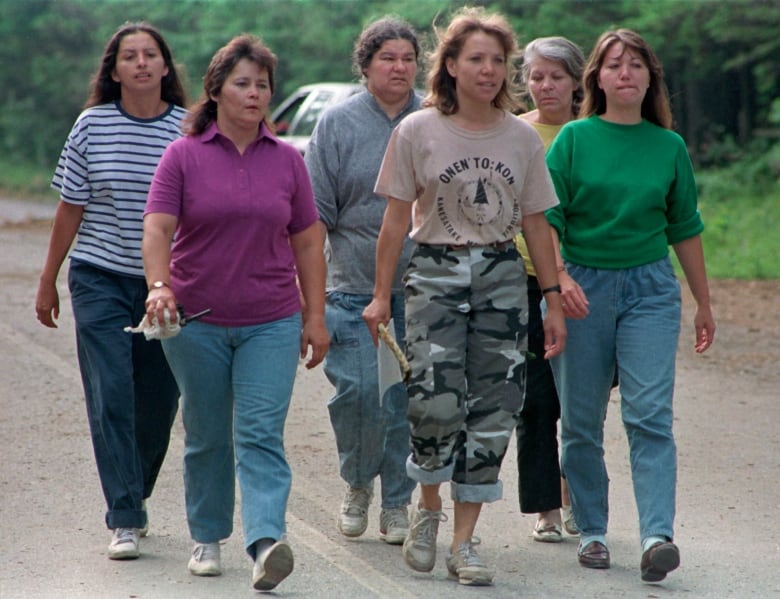
Katsi’tsakwas (Ellen Gabriel), a Kanien’kehá:ka (Mohawk) artist, filmmaker and activist, is the first Indigenous artist to win a prestigious Montreal arts prize.
The Grand Prix of the Conseil des arts de Montréal launched in 1985. The award, which recognizes her 35 years of activism and artistic work, includes a $30,000 grant.
“There were such strong and creative artists who were the finalists and so I’m very honoured,” Katsi’tsakwas said.
Her 2023 documentary Kanatenhs — When the Pine Needles Fall centres the voices of Kanien’kehá:ka women during the 78-day standoff in 1990 between the Kanien’kehá:ka community of Kanesatake, the Sûréte du Québec provincial police and, later, the Canadian military over a contested area of land known as the Pines northwest of Montreal.
Katsi’tsakwas says this is mistakenly referred to as the Oka Crisis, although it happened on Kanien’kehá:ka land.
She said when a SWAT team first arrived, they were met by unarmed Kanien’kehá:ka women who are considered title holders and therefore protectors of the land.

“We had the examples of our mothers and aunties and grandmothers before us,” she said.
She said the men in her community displayed courage but the contribution to the resistance by Indigenous women has been overlooked.
Katsi’tsakwas said her film reclaims a narrative, distorted through colonization, where her female ancestors felt the brutality of colonization on their families, their land and communities but were not relegated to the sidelines of the resistance.
“It’s time for women to be recognized for their equal part in the survival of our people,” said Katsi’tsakwas.
The Jury Prize offered by the Caisse Desjardins de la Culture, and the Télé-Québec Audience Award were both awarded to the same organization, circus arts company Marguerite à bicyclette.
The jury’s criteria for the 38th Grand Prix were innovation, uniqueness and authenticity of the artistic approach, the will to take action and desire to have an impact on the community, and the originality and relevance of strategies to reach audiences in Montréal or mobilize the target community.
Mylène Guay, cultural advisor – Indigenous arts for the Conseil des arts de Montréal, said it’s a very competitive process.
“They mostly selected her because she has such a strong voice in communities, especially in Kanesatake,” Guay said.
The prize recognizes Katsi’tsakwas’s career as a visual artist as well as the impact her activism has had on Indigenous and environmental rights.
Visual artist Hannah Claus, who is Kanien’kehá:ka from Tyendinaga Mohawk Territory in Ontario, attended last week’s award ceremony.
Claus was on the board of the Conseil des arts de Montréal for six years and is still on its Indigenous Arts evaluation committee.
“I knew that she’d gone back to film school and just was so thrilled that she’d made this film,” Claus said.
“This is something near and dear to her heart really, and that she was able to to put it together and out in the world like that, I just thought that was so amazing.”
Kanatenhs – When The Pine Needles Fall won the award for Best Canadian Short Film during the International First Peoples Festival in Montreal last year, and has screened at nearly 30 festivals around the world.